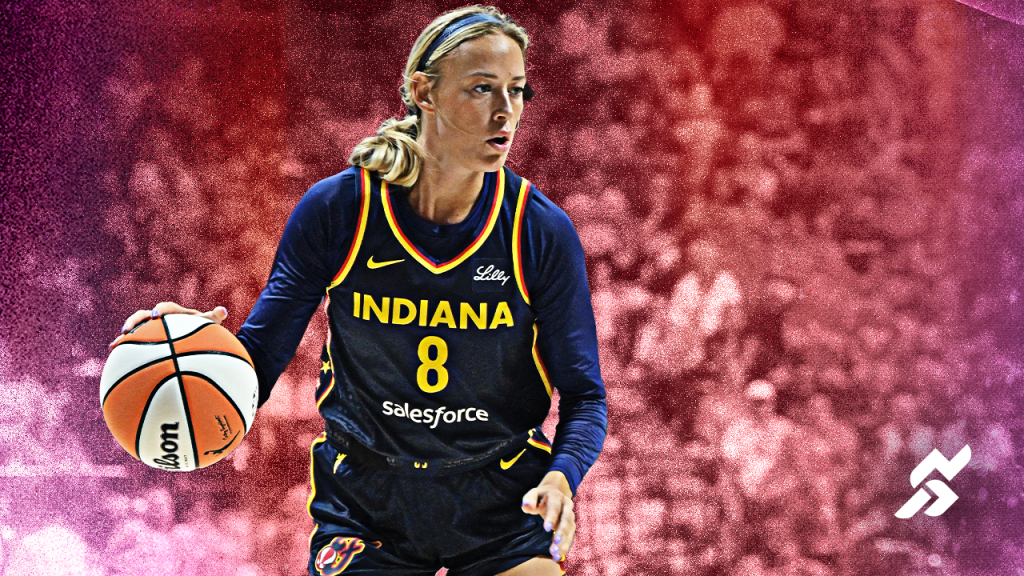Sophie Cunningham is the latest WNBA star to commit to the new global basketball league currently named Project B. The league plans to put on a series of men’s and women’s tournaments beginning next winter that represent “the best basketball in the world,” according to co-founder Grady Burnett.
Cunningham emerged as one of the WNBA’s biggest online stars during her first season alongside Caitlin Clark on the Indiana Fever this summer. She currently has nearly 3 million followers across Instagram and TikTok, and she has repped a range of brands, including Adidas and Arby’s. Cunningham has also been vocal about league issues, from the lack of players’ say in the league’s decision to expand to certain cities to the union’s current push for a guaranteed share of league revenue for players in ongoing CBA talks.
“Our game is exploding in popularity, and I’m all in on carrying that momentum forward in any way I can, both at home in the US and beyond,” Cunningham said in a statement provided to Sportico.
Project B is giving its athletes equity in the new business. It has not commented on salary figures, though Front Office Sports reported that multiple stars have been offered deals with annual salaries of at least $2 million.
Much else remains unclear about the venture. Project B has now announced eight women’s players committed to the league, out of a planned total of 66 who will make up six 11-person teams. No men’s players have been named.
Founders have also faced questions about their connections to funding tied to Saudi Arabia following early reports, though Burnett has said that the cap table “doesn’t include any dollars from Saudi Arabia.” The company told Sportico that Project B does not have any investment from sovereign wealth funds nor any active discussions with them.
Project B’s stated goal is to put on tournaments across the world with Finals-level play in both men’s and women’s leagues while featuring a global player roster. Burnett said the league is also open to adding younger players who may not be eligible for the WNBA or NBA drafts. The WNBA currently restricts U.S. players from entering its league before the year they turn 22 or graduate from college.
Next year, Project B intends to play three tournaments in Asia, three in Europe and one in the Americas; no specific locations have been announced. The final tournament of the year would crown an overall champion. Its November-to-April footprint likely means players would have to choose between playing in Project B or competing in the NBA, existing overseas leagues that some WNBA players join during the American offseason and 3-on-3 league Unrivaled, which also boasts a player-ownership model.
Burnett and co-founder George Prentice, former college roommates, began working on the league less than three years ago after looking at sports with the perspective of tech executives. Between them, the two have served in executive roles for Google, Facebook and Skype.
“We just said, ‘Look, there’s a supply-demand mismatch,’” Burnett said, adding that leagues are still largely set up as nationally focused entities with domestic-dominated media deals while the internet has made it easier to engage global fandoms and follow athletes from around the world. “We think the next big platform company—outside of AI—could really be built at the intersection of sports and entertainment.”
Big-name investors have since joined in. Venture capital firms Mangrove Capital, Quiet Capital and Sequence Capital have stakes in the business. Athletes including Candace Parker, Steve Young, Novak Djokovic and Sloane Stephens have also invested, alongside business leaders John Chambers, Ime Archibong, Gaby Sulzberger, Niklas Zennstrom, Barry Eggers and Merline Saintil. Josh Childress, who made waves by jumping from the Atlanta Hawks to Greek club Olympiacos in 2008, is also an investor.
Four-time WNBA All-Star Alana Beard joined the effort as a co-founder and chief basketball officer, playing a key role in athlete recruitment. So far, the other WNBA players who have been announced as part of the league are Alyssa Thomas, Jewell Loyd, Jonquel Jones, Kelsey Mitchell, Kamilla Cardoso, Janelle Salaün and Li Meng. Thomas and Mitchell are currently slated to play in Unrivaled in 2026.
Like Unrivaled, Project B features an asset-light, centrally owned model rather than a more traditional city-based franchise organization, and the entity was set up to give its competitors equity in the league.
“That’s why I chose to invest in Project B,” Stephens said in a statement. “I believe athletes deserve real ownership and control over their careers. … Project B could serve as a blueprint for other sports, including tennis, to rethink how athletes participate in the value they create.”
When Burnett and Prentice began sketching out Project B, they identified basketball as “the right sport to start with” but not necessarily the end point. “We think the principles apply to other sports,” Burnett said.
While Project B maintains that it doesn’t receive direct funding connected to Saudi Arabia, the league says it is working with LA-based AEG and Sela, which is owned by Saudi Arabia’s sovereign wealth fund, to organize events in host cities. Saudi Arabia has become an increasingly popular destination for global sporting events, including the WTA Finals and the 2034 World Cup, despite pushback from those who argue the country’s values don’t align with those of many female athletes and fans.
“We don’t have a commitment to play there, but we’re looking at a wide range of cities,” Burnett said.
Project B hopes to engage local hoops fans in each destination with a two-week “cultural takeover” when it comes to town, Burnett said, while also making games and behind-the-scenes content widely available to fans around the world online.
Launching a league with Finals-level play for a global audience from day one is no easy feat, but Burnett said it was the only path for Project B. “Live, unscripted, superstar-driven events is what breaks through,” he said. “This has to be a big bang.”
